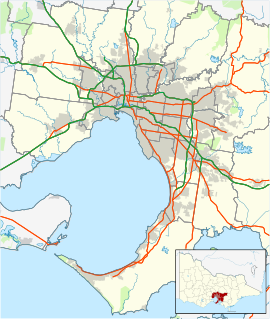Caulfield South, Victoria
|
Caulfield South Melbourne, Victoria |
|||||||||||||
|---|---|---|---|---|---|---|---|---|---|---|---|---|---|
| Coordinates | 37°53′28″S 145°01′34″E / 37.891°S 145.026°ECoordinates: 37°53′28″S 145°01′34″E / 37.891°S 145.026°E | ||||||||||||
| Population | 11,271 (2011) | ||||||||||||
| • Density | 3,420/km2 (8,850/sq mi) | ||||||||||||
| Postcode(s) | 3162 | ||||||||||||
| Area | 3.3 km2 (1.3 sq mi) | ||||||||||||
| Location | 12 km (7 mi) from Melbourne | ||||||||||||
| LGA(s) | City of Glen Eira | ||||||||||||
| State electorate(s) | Caulfield | ||||||||||||
| Federal Division(s) | Goldstein | ||||||||||||
|
|||||||||||||
Caulfield South is a suburb in Melbourne, Victoria, Australia, 10 km south-east from Melbourne's central business district. Its local government area is the City of Glen Eira. At the 2011 Census, Caulfield South had a population of 11,271.
Caulfield South is bounded by Glen Huntly Road to the north, Booran Road to the east, North Road to the south and Kooyong Road to the west. Although it has no railway station, it is serviced by tram routes 64 and 67. Elsternwick, Glenhuntly and Caulfield railway stations are all within a short drive, with both Elsternwick and Glenhuntly stations accessible via the number 67 tram.
One landmark of note is the Caulfield General Medical Centre, which began life as one of the local mansions, the Glen Eira. This was purchased in 1915 by the Australian Department of Defence and turned into No. 11 Army General Hospital where it served as a rehabilitation centre for returned servicemen from the Great War who sustained permanent or severe injuries. It has since undergone many changes of purpose and management and currently caters primarily for rehabilitation and geriatric medicine.
The Brighton Cemetery is also located in Caulfield South, and pre-dates the Caulfield Roads Board - the first official recognition of the suburb of Caulfield. Opened in 1855 it became, together with St Kilda Cemetery, an alternative resting place for those who had lived south of the Yarra River. There are up 70,000 people interred, including famous Australian artists, politicians and military heroes.
Caulfield South has many parks and gardens, the most notable of which is Princes Park. The area was a council landfill up until the middle of the twentieth century, when it was transformed into public park lands. It has been improved further and now includes several ovals and playing fields, sports clubs, pavillons, open spaces, children's playgrounds and many paved walking tracks with dog walking welcome.
...
Wikipedia

